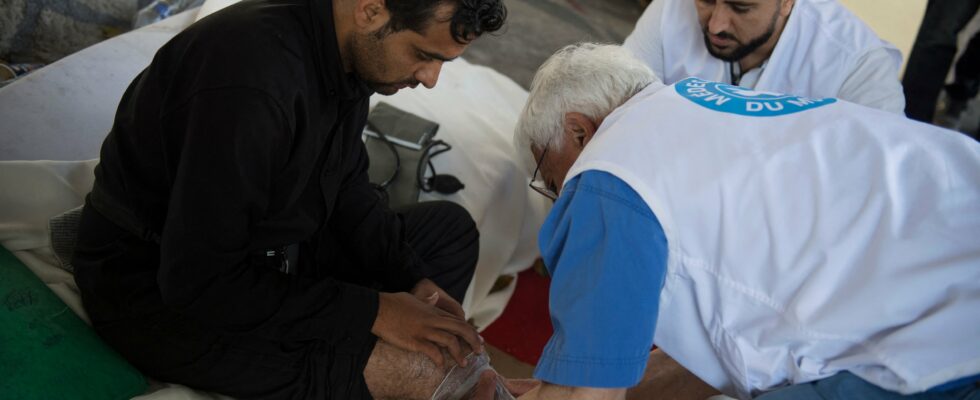Each time state medical aid (AME) comes back into the public debate, an argument is mobilized by its detractors: France is an exceptional land in Europe. With this system, it would offer much more care to people in an irregular situation than the rest of the Old Continent. Asked about the means of combating illegal immigration shortly after his appointment, Prime Minister Michel Barnier denounced a French asymmetry that was unbearable in his eyes: “We are one of the countries which give the most advantages. I do not want that France is the most attractive country in Europe.”
Understand: if the AME only contributes little to illegal immigration – this is what the reports on the issue say – it would nevertheless remain more “attractive” in France than elsewhere. The opposition these days between the Minister of the Interior Bruno Retailleau and the Minister of Health Geneviève Darrieussecq has once again put another piece in the machine of this endless debate.
What is it really? As recalled by the 2019 report of the General Inspectorate of Social Affairs (Igas) and the so-called “Evin-Stefanini” report, submitted at the end of 2023, France is well at the top of the table. But the available data do not allow us to establish any form of French exception. And this general panorama needs to be qualified, depending on the criteria taken into account.
Thus, if the basket of care provided turns out to be very broad in France, this choice does not turn out to be specific: other nations offer comparable care, free of charge, without advance payment, for acts ranging from screening from dental care to surgical costs. This is the case of Spain, which tried to tighten its rules in 2012 before going back in 2018, or even of Italy.
Limit health risks
It is not simply out of solidarity that these countries have opted for this configuration, but to limit health risks. “It is better to treat pathologies before they worsen or spread and become emergencies,” summarizes Nicolas Vignier, doctor in Avicenne, and specialist in the issue of access to care. Prevention also costs, in principle, less expensive than deploying major means to save a person or counter an epidemic.
On other aspects, France is actually rather restrictive. Starting with the access conditions. “You have to make a request to Health Insurance, and provide several official documents, such as a proof of address, which most people in an irregular situation do not have,” continues Nicolas Vignier. In other countries, such as Italy, or certain German regions, support does not require any prior notification.
Another difference is that in these two countries, no deadline is applied. Support can be provided upon entry into the territory. Conversely, France, like Belgium, asks applicants to justify a presence on the territory of at least three months. Not the most generous then. And very far from the “third world” or “borderless” logic portrayed in the Bolloré group media, which is very active on the subject.
Some countries still have stricter proposals, at least in appearance: beyond emergencies, the United Kingdom and Denmark actually tend to charge for care, although hospitals have some leeway. Sweden limits its basket further, and in Switzerland, you must take out health insurance to be helped, regardless of your status.
Various situations
But these elements must be looked at with knowledge of local systems: is public support important? Is it easy to get regularized? “Certain systems are very decentralized, and allow a myriad of variations. And general philosophies in terms of health insurance can go from all covered to all paid. It is therefore impossible to transpose the systems,” summarizes Claude Evin, one of the authors of the Evin-Stéfanini report.
The situations are so diverse that the specialist, Minister of Health under Michel Rocard, had to order summary notes from our main neighbors. Without them, it’s impossible to see clearly. Even when we only take a single country as an example, the exercise is perilous. “Belgium, for example, is often cited by detractors of the AME because it has so-called “emergency” aid. Except that it does not have the same definition of emergency and in practice allows a whole preventive care panel”, illustrates the expert.
Another example: in fact, German federal law only provides emergency care. But it allows us to go further, at the discretion of the regions. The cost of this exceptional regime has been quantified by the German Parliament: 690 million euros in 2022. That is to say around half of the total French cost, just with non-urgent acts. In other words, if the device is different in appearance, more restricted, it seems ultimately correspond, in terms of scale, to what is practiced in France.
In the opinion of experts, in addition to being adventurous, these comparisons divert the debate from legitimate questions: “What we must ask ourselves is whether the AME is less expensive than a restricted service, which is what we clearly answer no. What’s more, its removal, in addition to being nonsense for health purposes, will have no benefit in terms of migration, because the vast majority of migrants are unaware of this right”, underlines Claude Evin. Elements that have been known for a long time, but deliberately ignored by the far right and part of the Republican right.
.
